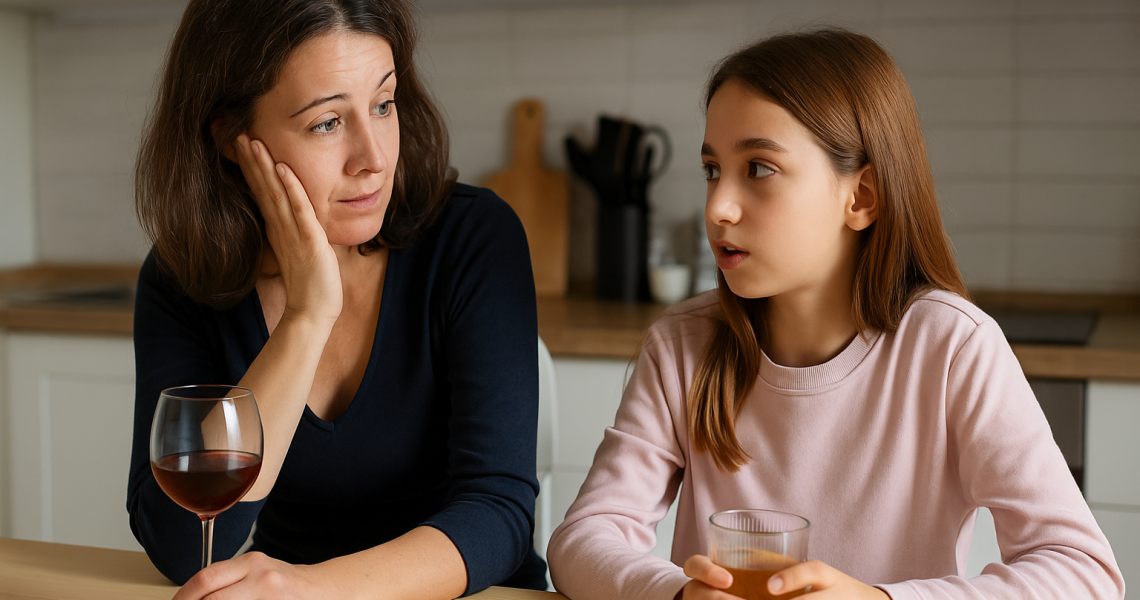Talking to your child about alcohol is more than just a warning, a stop sign or a simple mention of danger. It’s a real life choice, a moment of exchange – which can be asked gently – to enable your child to grow up confident, aware of the realities and in control of his or her choices.

Why open the discussion now
Your children are observant. Even before they hear the word “alcohol”, they see the way you hold a glass, the atmosphere at parties, the way you behave after a meal. From the age of 6 to 8, the notion of conviviality associated with a drink begins to make sense.
Rather than waiting for alcohol to become a hot topic or an embarrassing question, anticipating the dialogue means giving meaning to limits, opening windows for sharing and preventing children from finding themselves alone in a blurred social reflection.
Choosing the right moment, adapting your speech
It’s not a long theoretical talk. It’s an exchange. Depending on the child’s age, maturity and personality, the tone and vocabulary will change.
- For a 7-10 year old: “Drinking alcohol isn’t forbidden forever, but this body isn’t ready yet.”
- For a teenager: “You have the right to ask questions, to say no, to feel in control of your choices. Alcohol doesn’t define your pleasure, but sometimes it can become stronger than you.”
Prevention research clearly shows that a clear framework, regular discussion and an open attitude are far more effective than moralistic or ad hoc discourse. Harmonie Santé+1
The central role of example
It is often said that children do not follow a discourse, but a model. If the parent shows excessive or uninhibited consumption, the indirect message is strong.
Conversely, proposing alternatives, offering alcohol-free festive moments or simply drinking moderately with kindness, explaining: “I’ll have a drink but I’m keeping control, because I want to be there for you tomorrow” – that’s what resonates.
Public health studies show that it’s the adults’ posture around the child that makes the difference in the long term. addictions-france.org+1
| Read also: If you want to open a profitable franchise in the wellness sector, Mylasertabac offers you a turnkey franchise. |
Build a clear framework, without unnecessary rigidity
Talking about alcohol doesn’t mean prohibiting it at all costs. It means setting benchmarks, rules and times for discussion.
You can say, “I have a rule: you wait until you’re 18 to have a drink. In the meantime, we’ll talk, ask questions and explain why.”
It’s a respectful attitude that prepares the future adult.
The UNAF guide reminds us that this combination of information + dialogue + rules is a powerful prevention lever. Unaf
When alcohol becomes a sensitive subject
Sometimes the child asks disturbing questions: “And if I drink, will I become an alcoholic?” or “Why do you sometimes drink more than usual?
Stay calm. Welcome curiosity. You might say: “Drinking alcohol is a choice to relax, but our bodies and brains aren’t always ready.
This openness turns the child into a partner in the dialogue, not a passive listener.
Alternatives to glass: adding value without guilt
One way of calming the mood is to offer festive non-alcoholic drinks, or different sharing moments: a mocktail, fresh juice, a game, a late-night chat.
By showing that pleasure can exist outside a drink, you send the message: “The mood, the laughter, the moment remain. What changes is the automatic gesture.”
These little touches give meaning to your posture.
The role of the professional when doubts arise
If you notice signs of early use, group pressure or discomfort in your child, don’t hesitate to consult a professional: a doctor, an addictologist or a psychologist.
The important thing is to show that this is not a sign of weakness, but an act of care: “I’m helping you, I’m supporting you.”
Resources are numerous, reliable and accessible. The key is to take action.
Why this dialogue is a key to life
When you discuss alcohol with your child, you’re not just talking about a substance.
You’re talking about trust, respect and freedom of choice. Together, you build a responsible relationship with yourself and with others.
You give your child the ability to say no, to refuse a drink, to extend the evening without imposed moderation.
You offer your child a lighter, fuller life, with solid points of reference.
In conclusion
Talking to your child about alcohol is not a chore, it’s a gift.
A gift of time, of listening, of transparency.
A gift that allows the child to grow up free, to make his or her own choices, to feel respected and supported.
Don’t let alcohol become a taboo subject. Turn it into an open dialogue.
Because what you say today, your child will say tomorrow.
And that counts for life.
